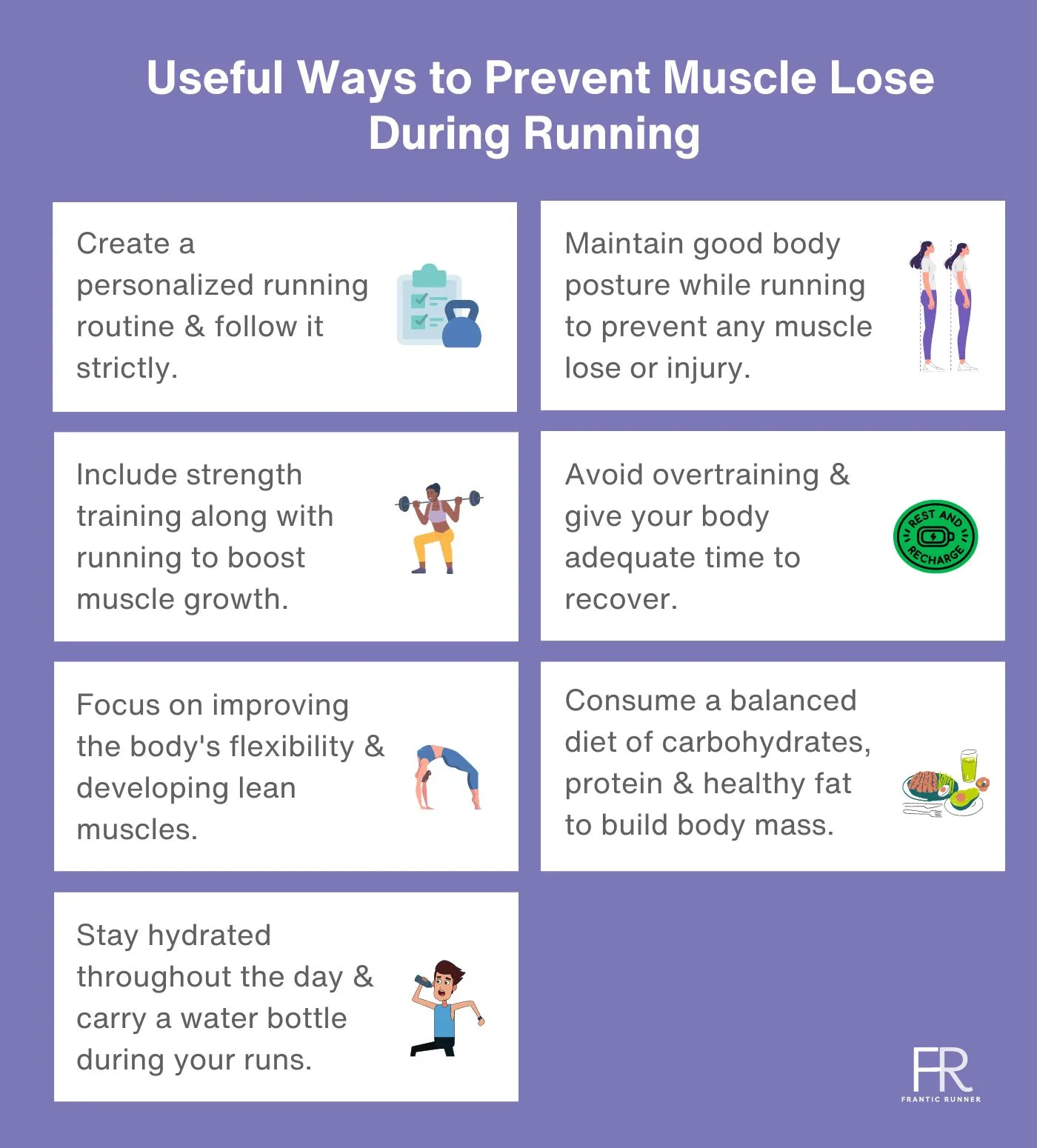Will Running Lose Or Build Muscle? (11 Ways To Prevent It!)
As a runner, we have always come across the statement that running can make you lose a lot of muscle. This is quite the opposite of our running goal of building muscle mass. So, is it true?
Running has many benefits like reducing stress, losing weight, quality sleep, thus improving your overall mental and physical health. But, doing it the wrong way might also lead you to lose your body muscles quickly.
Running is a great way to build muscles when combined with the right direction and suitable nutrition. It will help you gain muscle mass, primarily around your lower body, such as legs, glutes, hamstrings, etc.
Runners have strong leg muscles and maintain muscle mass by running regularly with the right approach.
We created this guide to clarify, “Will running lose or build muscle?”. We will help you learn the right ways of running without sacrificing muscle mass.
How Does Running Strengthen Muscles?
As an aerobic exercise, running helps strengthen muscles by boosting protein muscle growth and reducing muscle protein breakdown. A high-protein diet and interval running exercises are crucial to stimulate your body’s muscle protein synthesis that helps gain muscle mass.
Research conducted a 10-week training program of interval running and strength exercises to measure changes in muscle strength, which resulted in a 9.3% increase in the strength of leg muscles while running.
Running increases muscle mass in the upper body and arms, but most frequently in the lower body. Interval running is ideal for faster growth, which means running at high speed for short distances and taking breaks.
11 Running Ways To Prevent Muscle Loss And Gain More Muscles
How can you run without losing muscle mass when you’ve tried every possible act to maintain it? Running helps in burning calories and losing fat.
Related Article: “Does Running Burn Belly Fat And Love Handles? (5 Easy Tips)”
However, sometimes, it doesn’t help your body build mass either. That is because it depends on different factors like duration, intensity, and dietary habits.
You should follow the below-given ways to prevent losing your muscles and love to gain while running every day.
1. Create A Balanced Running Routine
Does running kill your muscle gains? Yes. Protein contributes around 10% of the energy needed for running at normal to high speed. Hence, you lose this much muscle mass every time you run. The longer you run at high speed, the more muscles you lose!
Develop an intentional running habit suitable for you. Set a short duration timer for a high-intensity run. Take breaks and hydrate with energy drinks or water, and incorporate protein-rich nutrition into your diet.
If you take short-distance high-speed running with a high-fiber diet, you will build muscle and lose fat. But long-distance runners with a planned diet and slow/high running, lose weight drastically. However, it takes time to regain mass.
Related Article: “Long-Distance Running Vs Sprinting (7 In-Depth Comparisons)”
2. Incorporate Resistance Training And Interval Workout
When you start running with proper diet and hydration, add strength training into your routine to enhance efficiency. Start with 5 minutes of jogging or jumping for warm-up, followed by high-intensity interval running sessions. Take rest, and the next day perform some squats, lunges, planks, lift weights, etc.
Related Article: “Why Is Running So Hard For Me? (15 Easy Tips For Beginners)”
You can divide both running and resistance training into alternative days or 2-3 times per week or do both on the same day.
Related Article: “13 Astonishing Benefits Of Running 3 Times A Week”
When you combine running with slight workout training, your body promotes instant muscle growth. It also prevents any muscle loss or injury, and confidently gains more strength. Muscle strength is important to run faster and provide balance to prevent any injury.
A study published in 2022 shows the effect of resistance exercise on improving running performance in athletes. It concluded that lower body strength training with high-intensity running increases running efficiency and reduces the risk of injury or muscle loss.
3. Acquire Proper Running Form
If you want to be effective in running, focus on improving your posture while running. It will help prevent imbalance that can lead your body to confront injury or lose muscle.
Related Article: “Can Running Increase Height? (7 Useful Ways to Achieve It)”
Proper running form is crucial for your overall body health and lets you run longer distances at high speed with no hassle. Follow the following tips to become an efficient runner!
- First & foremost, wear your most suitable shoes.
Related Article: “7 Best Carbon-Plated Running Shoes (Tested By Runners)“
- If jogging, do not bow down, and slightly lift your hands near your chest to help maintain posture.
- In sprinting or high-intensity running, slightly bow down, relax your shoulders and hands, and keep your hands at 90 angles.
- Open shoulders and a lifted back will naturally straighten up your back.
Related Article: “Is Running Bad For Scoliosis? (Expert’s Insight)”
- Avoid pressurizing and let yourself go with the flow.
In addition, maintaining your posture during your strength training session will help prevent muscle injury and enhance efficiency. It takes time to build muscles in the upper body and arms via running. But, the more effort you give to both running and strength training, the faster you will achieve worthy results.
4. Let Your Body Rest And Recover
Don’t forget you are human, and your body needs time to relax, repair, and revitalize.
If you are running with strength training daily, it will damage joints and muscles, so don’t be harsh on yourself. High-intensity resistance training can cause exercise-induced damage to muscles, which need time to repair.
Schedule rest days for muscle recovery and get quality sleep to enhance the process and running efficiency. This way, you feel relaxed and active all day and have the potential to embrace every challenge
5. Fuel Your Body With More Protein For More Mass
Running with hardcore exercise itself cannot make muscle proteins. However, consuming proteins boosts the process of protein synthesis. It makes new muscular tissues for gaining body mass and strength. Our body requires energy to do any work, even for movement.
Two American health experts found that consuming 20-25g of high-quality protein can help young adults build muscle. In conclusion, a person should take 0.4g per kg of protein in a single meal, four times a day.
If you just run and follow a solid protein diet, you will lose fat, build muscle, and achieve your desired body.
According to a recent study, when doing a High-Intensity Interval Training (HITT) workout, consuming 20g of protein right after the training every three hours helps build body mass.
6. Improve Mobility: Flexible And Lean Body
As discussed, strength exercises or interval training with running boosts growth hormone production. It helps produce more protein and ultimately increases muscle fibers.
This way, you won’t lose any muscle. But in fact, you can lose extra fat, improve body flexibility, and make it more agile.
7. Listen To Your Body And See Over-Training Symptoms
Never get too motivated or extra energetic, and start working hard on your first day of running or exercising.
Remember that your body gives signs of pain or fatigue. Hence, adjust your routine, give rest to your body, and avoid overexertion.
8. Run On A Fasted State Or Low-Carb Diet
If you are overweight and want to run without losing muscle, you can try running on an empty stomach.
Related Article: “9 Benefits Of Running Before Sunrise (+Tips To Get Started)”
Another option is to follow a low-carb diet. These methods may help you achieve your goal of running without losing muscle mass.
Your body will naturally burn body fat, i.e., glycogen storage depletion. An immediate post-exercise meal will help maximize your muscle growth.
9. Hydration Is Like Oxygen For Runners
Ignoring body hydration while running or exercising will worsen hormonal or overall body functions.
Research proves water intake is essential for performance and muscle loss prevention. Your body fluid helps maintain heart stress and overall body functions.
10. Track Your Time And See The Difference
Track your activities from running span and eating to sleeping duration. Identify how long your body takes to build muscles.
Analyse your body before and after running. For e.g. when do you lose muscle, what things could bring the real change. For example, proper routine, right protein diet, or change in eating habits after running or exercising.
11. Stay Away From Misconceptions
People have useless misconceptions like running (cardio) kills muscle gains or running is bad for muscle gains. Many beginners also believe that running builds muscles in the upper body and arms, and so on.
Running is cardio exercise, burns calories, and makes your stomach flat. However, strength or resistance training with running alongside a nutritional diet will prevent muscle loss and help with muscle building.
Conclusion
The function of your body’s growth hormones depends on your genetics, which can slow down your muscle growth as you age. To change the norm, you have to train your body to work hard, move by running, and eat a planned diet, which helps your body build more muscles and lose more fat.
Selecting the right running gear like “9 Best Running Shoes For Forefoot Strikers (Road-Tested)”, highly facilitates you to achieve your body goals and prevents any stress or injuries
Frequently Asked Questions (FAQs)
Slow and long-distance running can stop muscle growth, but short and high-intensity running can promote muscle gain.
Yes, running can increase muscle growth, especially around the legs or hips, but eating protein encourages proper growth.
You can run without losing your body muscles if you eat protein-rich meals, giving you more power and preventing muscle loss.
You will lose muscle if you don’t give your body the proper nutrition it needs.



